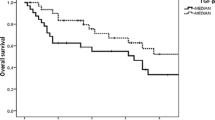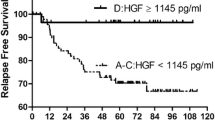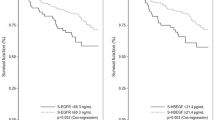Abstract
The transforming growth factor beta 1 (TGFB1) is a regulatory cytokine with both tumor suppressor and tumor-promoting effects in breast cancer (BC) cell lines and tissue. Data about level of circulating TGFB1 and its prognostic significance in BC patients is conflicting. The objective of this study is to determine the clinical significance of the serum TGFB1 levels in BC patients. We enrolled 96 female patients with histopathologically diagnosed BC who did not receive chemotherapy (CT) or radiotherapy. Serum TGFB1 levels were measured by ELISA method and compared with 30 healthy controls. The mean serum TGFB1 level of BC patients was significantly higher than controls (0.08 vs. 0.04 ng/ml, p < 0.001). There was no significant difference according to known disease-related clinicopathological or laboratory parameters. Serum TGFB1 level had a significant impact on overall survival in both univariate (p = 0.01) and multivariate analysis (p = 0.013). Serum TGFB1 level is elevated in BC patients and has a favorable prognostic value. However, it has no predictive role on CT response.



Similar content being viewed by others
References
Ferlay J, Shin HR, Bray F, Forman D, Mathers C, Parkin DM. Estimates of worldwide burden of cancer in 2008: GLOBOCAN 2008. Int J Cancer. 2010;127:2893–917.
Massague’ J. TGF b in cancer. Cell. 2008;134:215–30.
Ilunga K, Nishiura R, Inada H, El-Karef A, Imanaka-Yoshida K, Sakakura T, et al. Co-stimulation of human breast cancer cells with transforming growth factor-beta and tenascin-C enhances matrix metalloproteinase-9 expression and cancer cell invasion. Int J Exp Pathol. 2004;85(6):373–9.
Moses H, Barcellos-Hoff MH. TGF-beta biology in mammary development and breast cancer. Cold Spring Harb Perspect Biol. 2011;3(1):a003277.
Maxwell CA, Fleisch MC, Costes SV, Erickson AC, Boissiere A, Gupta R, et al. Targeted and nontargeted effects of ionizing radiation that impact genomic instability. Cancer Res. 2008;68:8304–11.
Li B, Wen G, Zhao Y, Tong J, Hei TK. The role of TGFBI in mesothelioma and breast cancer: association with tumor suppression. BMC Cancer. 2012;12:239.
Wen G, Partridge MA, Li B, Hong M, Liao W, Cheng SK, et al. TGFBI expression reduces in vitro and in vivo metastatic potential of lung and breast tumor cells. Cancer Lett. 2011;308(1):23–32.
Forrester E, Chytil A, Bierie B, Aakre M, Gorska AE, Sharif-Afshar AR, et al. Effect of conditional knockout of the type II TGF-b receptor gene in mammary epithelia on mammary gland development and polyomavirus middle T antigen induced tumor formation and metastasis. Cancer Res. 2005;65:2296–302.
Yang L, Huang J, Ren X, Gorska AE, Chytil A, Aakre M, et al. Abrogation of TGF beta signaling in mammary carcinomas recruits Gr-1 + CD11b + myeloid cells that promote metastasis. Cancer Cell. 2008;13:23–35.
Kong FM, Anscher MS, Murase T, Abbott BD, Iglehart JD, Jirtle RL. Elevated plasma transforming growth factor-beta 1 levels in breast cancer patients decrease after surgical removal of the tumor. Ann Surg. 1995;222(2):155–62.
Hartmann MC, Dwyer RM, Costello M, Potter SM, Curran C, Hennessy E, et al. Relationship between CCL5 and transforming growth factor-β1 (TGFβ1) in breast cancer. Eur J Cancer. 2011;47(11):1669–75.
Gorsch SM, Memoli VA, Stukel TA, Gold LI, Arrick BA. Immunohistochemical staining for transforming growth factor beta 1 associates with disease progression in human breast cancer. Cancer Res. 1992;52(24):6949–52.
Desruisseau S, Palmari J, Giusti C, Romain S, Martin PM, Berthois Y. Determination of TGF beta1 protein level in human primary breast cancers and its relationship with survival. Br J Cancer. 2006;94(2):239–46.
Bao J, Wu ZS, Qi Y, Wu Q, Yang F. Expression of TGF-beta1 and the mechanism of invasiveness and metastasis induced by TGF-beta1 in breast cancer. Zhonghua Zhong Liu Za Zhi. 2009;31(9):679–82.
Ya Y, Dukhanina O, Tang B, Mamura M, Letterio JJ, MacGregor J, et al. Lifetime exposure to a soluble TGF-{b} antagonist protects mice against metastasis without adverse side effects. J Clin Invest. 2002;109:1607–15.
Gorska AE, Jensen RA, Shyr Y, Aakre ME, Bhowmick NA, Moses HL. Transgenic mice expressing a dominant- negative mutant type II transforming growth factor-b receptor exhibit impaired mammary development and enhanced mammary tumor formation. Am J Pathol. 2003;163:1539–49.
Zhou YH, Liao SJ, Li D, Luo J, Wei JJ, Yan B, et al. TLR4 ligand/H2O2 enhances TGF-β1 signaling to induce metastatic potential of non-invasive breast cancer cells by activating non-Smad pathways. PLoS One. 2013;8(5):e65906.
Moore LD, Isayeva T, Siegal GP, Ponnazhagan S. Silencing of transforming growth factor-beta1 in situ by RNA interference for breast cancer: implications for proliferation and migration in vitro and metastasis in vivo. Clin Cancer Res. 2008;14(15):4961–70.
Muraoka RS, Dumont N, Ritter CA, Dugger TC, Brantley DM, Chen J, et al. Blockade of TGF-beta inhibits mammary tumor cell viability, migration, and metastases. J Clin Invest. 2002;109(12):1551–9.
Casey TM, Eneman J, Crocker A, White J, Tessitore J, Stanley M, et al. Cancer associated fibroblasts stimulated by transforming growth factor beta1 (TGF-beta 1) increase invasion rate of tumor cells: a population study. Breast Cancer Res Treat. 2008;110(1):39–49.
Sovak MA, Arsura M, Zanieski G, Kavanagh KT, Sonenshein GE. The inhibitory effects of transforming growth factor beta1 on breast cancer cell proliferation are mediated through regulation of aberrant nuclear factor-kappa B/Rel expression. Cell Growth Differ. 1999;10(8):537–44.
Ito M, Minamiya Y, Kawai H, Saito S, Saito H, Nakagawa T, et al. Tumor-derived TGF beta-1 induces dendritic cell apoptosis in the sentinel lymph node. J Immunol. 2006;176(9):5637–43.
Wang Y, Lui WY. Transforming growth factor-β1 attenuates junctional adhesion molecule-A and contributes to breast cancer cell invasion. Eur J Cancer. 2012;48(18):3475–87.
Todorović-Raković N. TGF-beta 1 could be a missing link in the interplay between ER and HER-2 in breast cancer. Med Hypotheses. 2005;65(3):546–51.
Northey JJ, Dong Z, Ngan E, Kaplan A, Hardy WR, Pawson T, et al. Distinct phosphotyrosine-dependent functions of the ShcA adaptor protein are required for transforming growth factor β (TGFβ)-induced breast cancer cell migration, invasion, and metastasis. J Biol Chem. 2013;288(7):5210–122.
Fynan TM, Reiss M. Resistance to inhibition of cell growth by transforming growth factor-b and its role in oncogenesis. Critical Rev Oncogen. 1993;4:493–540.
Ivanović V, Demajo M, Krtolica K, Krajnović M, Konstantinović M, Baltić V, et al. Elevated plasma TGF-beta1 levels correlate with decreased survival of metastatic breast cancer patients. Clin Chim Acta. 2006;371(1–2):191–3.
Kajdaniuk D, Marek B, Swietochowska E, Ostrowska Z, Glogowska-Szelag J, Kos-Kudla B, et al. Plasma transforming growth factor beta1 in breast cancer patients treated with CMF chemotherapy. J Clin Pharm Ther. 2000;25(4):291–4.
Panis C, Herrera AC, Victorino VJ, Aranome AM, Cecchini R. Screening of circulating TGF-β levels and its clinicopathological significance in human breast cancer. Anticancer Res. 2013;33(2):737–42.
Wakefield LM, Letterio JJ, Chen T, Danielpour D, Allison RS, Pai LH, et al. Transforming growth factor-beta1 circulates in normal human plasma and is unchanged in advanced metastatic breast cancer. Clin Cancer Res. 1995;1(1):129–36.
Sheen-Chen SM, Chen HS, Sheen CW, Eng HL, Chen WJ. Serum levels of transforming growth factor beta1 in patients with breast cancer. Arch Surg. 2001;136(8):937–40.
Chod J, Zavadova E, Halaska MJ, Strnad P, Fucikova T, Rob L. Preoperative transforming growth factor-beta 1 (TGF-beta 1) plasma levels in operable breast cancer patients. Eur J Gynaecol Oncol. 2008;29(6):613–6.
Dave H, Shah M, Trivedi S, Shukla S. Prognostic utility of circulating transforming growth factor beta 1 in breast cancer patients. Int J Biol Markers. 2012;27(1):53–9.
Ivanović V, Todorović-Raković N, Demajo M, Nesković-Konstantinović Z, Subota V, Ivanisević-Milovanović O, et al. Elevated plasma levels of transforming growth factor-beta 1 (TGF-beta 1) in patients with advanced breast cancer: association with disease progression. Eur J Cancer. 2003;39(4):454–61.
Korantzis I, Kalogeras KT, Papaxoinis G, Kotoula V, Koutras A, Soupos N, et al. Expression of angiogenic markers in the peripheral blood of patients with advanced breast cancer treated with weekly docetaxel. Anticancer Res. 2012;32(10):4569–80.
Duranyildiz D, Camlica H, Soydinc HO, Derin D, Yasasever V. Serum levels of angiogenic factors in early breast cancerremain close to normal. Breast. 2009;18(1):26–9.
Lebrecht A, Grimm C, Euller G, Ludwig E, Ulbrich E, Lantzsch T, et al. Transforming growth factor beta 1 serum levels in patients with preinvasive and invasive lesions of the breast. Int J Biol Markers. 2004;19(3):236–9.
Todorović-Raković N, Nesković-Konstantinović Z, Nikolić-Vukosavljević D. Stage-related plasma values of transforming growth factor-beta1 are steroid receptors dependent. Clin Exp Med. 2009;9(4):313–7.
Grau AM, Wen W, Ramroopsingh DS, Gao YT, Zi J, Cai Q, et al. Circulating transforming growth factor-beta-1 and breast cancer prognosis: results from the Shanghai Breast Cancer Study. Breast Cancer Res Treat. 2008;112(2):335–41.
Papadopoulou E, Anagnostopoulos K, Tripsianis G, Tentes I, Kakolyris S, Galazios G, et al. Evaluation of predictive and prognostic significance of serum TGF-beta1 levels in breast cancer according to HER-2 codon 655 polymorphism. neoplasma. 2008;55(3):229–38.
Conflicts of interest
None
Author information
Authors and Affiliations
Corresponding author
Rights and permissions
About this article
Cite this article
Ciftci, R., Tas, F., Yasasever, C.T. et al. High serum transforming growth factor beta 1 (TGFB1) level predicts better survival in breast cancer. Tumor Biol. 35, 6941–6948 (2014). https://doi.org/10.1007/s13277-014-1932-y
Received:
Accepted:
Published:
Issue Date:
DOI: https://doi.org/10.1007/s13277-014-1932-y




